
Belgium, officially the Kingdom of Belgium, is a country in Northwestern Europe. The country is bordered by the Netherlands to the north, Germany to the east, Luxembourg to the southeast, France to the south, and the North Sea to the west. It covers an area of 30,689 km2 (11,849 sq mi) and has a population of more than 11.7 million. With 383/km2 (990/sq mi), Belgium's population density ranks 22nd in the world and 6th in Europe. Belgium is part of an area known as the Low Countries, historically a somewhat larger region than the Benelux group of states, as it also included parts of northern France. The capital and largest metropolitan region is Brussels; other major cities are Antwerp, Ghent, Charleroi, Liège, Bruges, Namur, and Leuven.

Brussels, officially the Brussels-Capital Region, is a region of Belgium comprising 19 municipalities, including the City of Brussels, which is the capital of Belgium. The Brussels-Capital Region is located in the central portion of the country and is a part of both the French Community of Belgium and the Flemish Community, but is separate from the Flemish Region and the Walloon Region, located less than 4 kilometres (2.5 mi) to the south. Historically Dutch-speaking, Brussels saw a language shift to French from the late 19th century. Nowadays, the Brussels-Capital Region is officially bilingual in French and Dutch, although French is the majority language and lingua franca. Brussels is also increasingly becoming multilingual. English is spoken widely and many migrants and expatriates speak other languages as well.

Front 242 is a Belgian electronic music group that came into prominence during the 1980s. Pioneering the style they called electronic body music, they influenced the electronic and industrial music genres.

Belgium is a country in Europe and member of major international organizations like the European Union and NATO which are both headquartered in Brussels, Belgium.
Same-sex marriage has been legal in Belgium since 1 June 2003. A bill for the legalization of same-sex marriages was passed by the Senate on 28 November 2002, and by the Chamber of Representatives on 30 January 2003. King Albert II granted his assent, and the bill entered into force on 1 June. Polling indicates that a significant majority of Belgians support the legal recognition of same-sex marriage. Belgium was the second country in the world to legalise same-sex marriage, after the Netherlands.
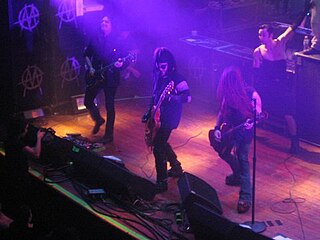
Revolting Cocks, also known as RevCo, are an American-Belgian industrial rock band, and sometimes supergroup, that began as a musical side project for Richard 23 of Front 242, Luc van Acker, and Al Jourgensen of Ministry.

The Vrije Universiteit Brussel is a Dutch and English-speaking research university in Brussels, Belgium. It has four campuses: Brussels Humanities, Science and Engineering Campus, Brussels Health Campus, Brussels Technology Campus and Brussels Photonics Campus.

The Free University of Brussels was a university in Brussels, Belgium. It existed between 1834 and 1969 when it split along linguistic lines.
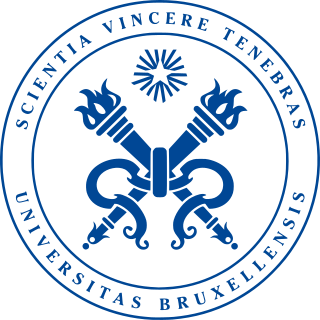
The Université libre de Bruxelles is a French-speaking research university in Brussels, Belgium. It has three campuses: the Solbosch campus, the Plaine campus and the Erasmus campus.
The Belgian Negationism law, passed on 23 March 1995, bans public denial of nazi genocide war crimes like the Holocaust. Specifically, this law against negationism makes it illegal to publicly "deny, play down, justify or approve of the genocide committed by the German National Socialist regime during the Second World War". Prosecution is led by the Belgian Centre for Equal Opportunities. The offense is punishable by imprisonment of up to one year and fines of up to 2,500 EUR.

Islam is the second largest religion in Belgium after Christianity. The exact number of Muslims in Belgium is unknown but various sources estimate that 4.0% to 7.6% of the country's population adheres to Islam. The first registered presence of Islam in Belgium was in 1829, but most Belgian Muslims are first-, second-, or third-generation immigrants that arrived after the 1960s.

The Benelux Parliament is one of the institutions of the Benelux economic union. The Parliament was established by an agreement signed by Belgium, the Netherlands and Luxembourg on 5 November 1955, which means it had already existed for three years when the Benelux Union was signed on 3 February 1958. The Benelux Parliament provides the governments with advice on economic and cross-frontier cooperation. Its recommendations may also concern other matters if common interests or current events so dictate. The parliament also keeps the three governments informed about the opinions that move in the parliamentary assemblies from which its members originate.

The Francization of Brussels refers to the evolution, over the past two centuries, of this historically Dutch-speaking city into one where French has become the majority language and lingua franca. The main cause of this transition was the rapid, compulsory assimilation of the Flemish population, amplified by immigration from France and Wallonia.
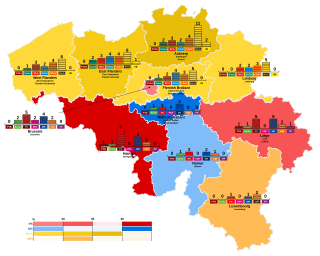
Federal elections were held in Belgium on 25 May 2014. All 150 members of the Chamber of Representatives were elected, whereas the Senate was no longer directly elected following the 2011–2012 state reform. These were the first elections held under King Philippe's reign.
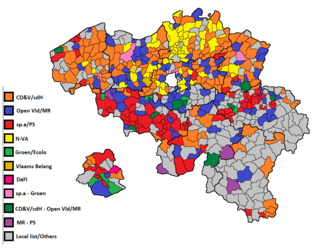
The Belgian provincial, municipal and district elections of 2018 took place on Sunday 14 October 2018. They are organised by the respective regions:
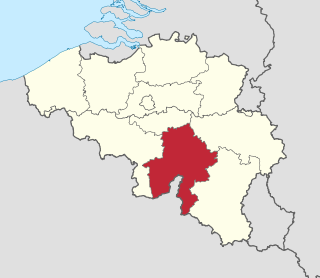
Namur is one of the 11 multi-member constituencies of the Chamber of Representatives, the lower house of the Belgian Federal Parliament, the national legislature of Belgium. The constituency was established as Namur-Dinant-Philippeville in 1995 following the fourth Belgian state reform. It was renamed Namur in 2003 following the re-organisation of constituencies across Belgium along provincial lines. It is conterminous with the province of Namur. The constituency currently elects six of the 150 members of the Chamber of Representatives using the open party-list proportional representation electoral system. At the 2019 federal election the constituency had 379,299 registered electors.

Liège is one of the 11 multi-member constituencies of the Chamber of Representatives, the lower house of the Belgian Federal Parliament, the national legislature of Belgium. The constituency was established in 2003 following the re-organisation of constituencies across Belgium along provincial lines. It is conterminous with the province of Liège. The constituency currently elects 15 of the 150 members of the Chamber of Representatives using the open party-list proportional representation electoral system. At the 2019 federal election the constituency had 794,378 registered electors.

Hainaut is one of the 11 multi-member constituencies of the Chamber of Representatives, the lower house of the Belgian Federal Parliament, the national legislature of Belgium. The constituency was established in 2003 following the re-organisation of constituencies across Belgium along provincial lines. It is conterminous with the province of Hainaut. The constituency currently elects 18 of the 150 members of the Chamber of Representatives using the open party-list proportional representation electoral system. At the 2019 federal election the constituency had 942,789 registered electors.

Brussels is one of the 11 multi-member constituencies of the Chamber of Representatives, the lower house of the Belgian Federal Parliament, the national legislature of Belgium. The constituency was established in 2014 following the Sixth Belgian state reform. It is conterminous with the region of Brussels. The constituency currently elects 15 of the 150 members of the Chamber of Representatives using the open party-list proportional representation electoral system. At the 2019 federal election the constituency had 623,162 registered electors.

Zakia Khattabi is a Belgian-Moroccan politician who was the co-president of the Ecolo party.


















